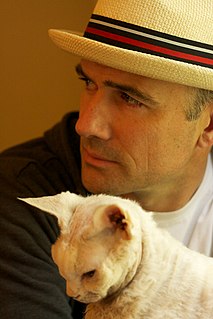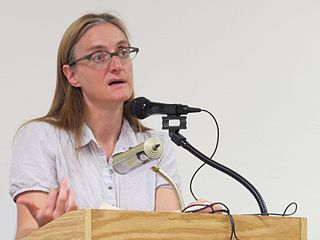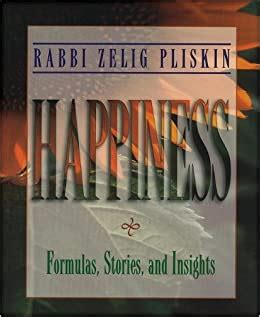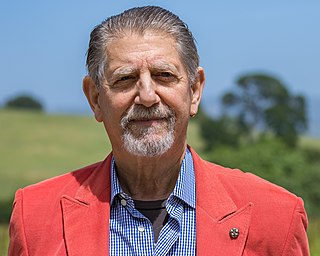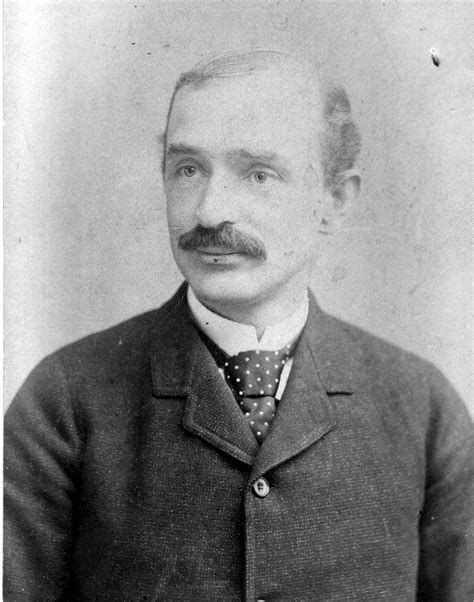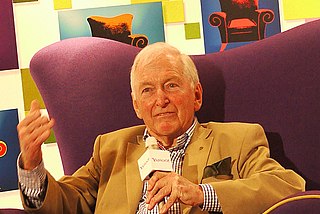Top 344 Bees Quotes & Sayings - Page 6
Explore popular Bees quotes.
Last updated on December 21, 2024.
I see what I want of Love... I see horses making the meadow dance, fifty guitars sighing, and a swarm of bees suckling the wild berries, and I close my eyes until I see our shadow behind this dispossessed place... I see what I want of people: their desire to long for anything, their lateness in getting to work and their hurry to return to their folk... and their need to say: Good Morning.
we are continually overflowing toward those who preceded us, toward our origin, and toward those who seemingly come after us. ... It is our task to imprint this temporary, perishable earth into ourselves so deeply, so painfully and passionately, that its essence can rise again “invisibly,” inside us. We are the bees of the invisible. We wildly collect the honey of the visible, to store it in the great golden hive of the invisible.
Grampa took Mary Ellen inside away from the crowd. "Now, child, I am going to show you what my father showed me, and his father before," he said quietly. He spooned the honey onto the cover of one of her books. "Taste," he said, almost in a whisper. . . . "There is such sweetness inside of that book too!" he said thoughtfully. "Such things...adventure, knowledge and wisdom. But these things do not come easily. You have to pursue them. Just like we ran after the bees to find their tree, so you must also chase these things through the pages of a book!
Some men spend their lives watching bees and ants, noting down the habits of these insects; my pleasure is to watch the human mind, noting how unselfish instincts rise to the surface and sink back again, making way for selfish instincts, each equally necessary, for the world would perish were it to become entirely selfish or entirely unselfish.
This planet is an exquisitely arranged and interconnected system. What's controlled in one place is going to have consequences in another place. Our job as gardeners is to try and figure this out no matter how small our allotted space might be. Discipline has to be the watchword for our controlling hands. It means not gardening without thinking of the garden as a habitat: for mice, for squirrels, for bees and wasps. For other living creatures beyond ourselves.
The thread has snapped. No sound even to mark the breaking let alone the fall. That long anticipated disintegration, when the darkest angel of all, the horror beyond all horrors, sits at last upon my chest, permanently enfolding me in its great covering wings, black as ink, veined in Bees' purple. A creature without a voice. A voice without a name. As immortal as my life. Come here at long last to summon the wind.
The dog that buried the bone which even a canine appetite could not manage, the squirrel that gathered nuts for a later feast, the bees that filled the comb with honey, the ants that laid up stores for a rainy day - these were among the first creators of civilization. It was they....who taught our ancestors the art of providing for tomorrow out of the surplus of today, or of preparing for winter in summer's time of plenty.
I don't know Hillary's Clinton stance on urban farming. I don't know Donald Trump's stance or Bernie Sanders's for that matter. But the Obamas have been amazing. You know, Michelle Obama, she planted that garden. She keeps bees there at the White House. Little known fact, though, is that Laura Bush also had an organic garden but she never told anyone about it.
I must say what I admire most is the person who masters an area of practical experience, and can teach me something. I mean, my local midwife has taught me how to keep bees. Well, she can't understand anything I write. And I find myself liking her, may I say, more than most poets. And among my friends I find people who know all about boats or know all about certain sports, or how to cut somebody open and remove an organ. I'm fascinated by this mastery of the practical.
Every child should have mud pies, grasshoppers, water bugs, tadpoles, frogs, mud turtles, elderberries, wild strawberries, acorns, chestnuts, trees to climb. Brooks to wade, water lilies, woodchucks, bats, bees, butterflies, various animals to pet, hayfields, pine-cones, rocks to roll, sand, snakes, huckleberries and hornets; and any child who has been deprived of these has been deprived of the best part of education.
Outside his office my father had a framed copy of a letter written by Abraham Lincoln to his son's teacher, translated into Pashto. It is a very beautiful letter, full of good advice. Teach him, if you can, the wonder of books...But also give him quiet time to ponder the eternal mystery of birds in the sky, bees in the sun, and the flowers on a green hillside, it says. Teach him it is far more honorable to fail than to cheat.
Lately I was near the beehives and some of the bees flew onto my face. I wanted to raise my hand, and brush them off. 'No,' said a peasant to me, 'do not be afraid, and do not touch them. They will not sting you at all, if you touch them they will bite you.' I trusted him; not one bit me. Trust me; do not fear these temptations. Do not touch them; they will not hurt you.
Even the best critical writing on Emily Dickinson underestimates her. She is frightening. To come to her directly from Dante, Spenser, Blake, and Baudelaire is to find her sadomasochism obvious and flagrant. Birds, bees, and amputated hands are the dizzy stuff of this poetry. Dickinson is like the homosexual cultist draping himself in black leather and chains to bring the idea of masculinity into aggressive visibility.
As for me, I know nothing else but miracles,
Whether I walk the streets of Manhattan,
Or dart my sight over the roofs of houses toward the sky,
Or wade with naked feet along the beach just in the edge of the water,
Or stand under the trees in the woods,
Or talk by day with any one I love,
Or sleep in bed at night with any one I love,
Or watch honey bees busy around the hive of a summer forenoon...
Or the wonderfulness of the sundown,
Or of stars shining so quiet and bright,
Or the exquisite delicate thin curve of the new moon in spring...
What stranger miracles are there?
If writing novels is like planting a forest, then writing short stories is more like planting a garden. The two processes complement each other, creating a complete landscape that I treasure. The green foliage of the trees casts a pleasant shade over the earth, and the wind rustles the leaves, which are sometimes dyed a brilliant gold. Meanwhile, in the garden, buds appear on the flowers, and colorful petals attract bees and butterflies, reminding us of the subtle transition from one season to the next.
Oh, give us pleasure in the flowers to-day;
And give us not to think so far away
As the uncertain harvest; keep us here
All simply in the springing of the year.
Oh, give us pleasure in the orchard white,
Like nothing else by day, like ghosts by night;
And make us happy in the happy bees,
The swarm dilating round the perfect trees.
She looked into the distance, and the old terror flamed up for an instant, then sank again. Edna heard her father's voice and her sister Margaret's. She heard the barking of an old dog that was chained to the sycamore tree. The spurs of the cavalry officer clanged as he walked across the porch. There was the hum of bees, and the musky odor of pinks filled the air. (last lines)
I here present thee with a hive of bees, laden some with wax, and some with honey. Fear not to approach! there are no wasps, there are no hornets here. If some wanton bee chance to buzz about thine ears, stand thy ground and hold thy hands-there's none will sting thee, if thou strike not first. If any do, she hath honey in her bag will cure thee too.
Contact with [menstrual blood] turns new wine sour, crops touched by it become barren, grafts die, seed in gardens are dried up, the fruit of trees fall off, the edge of steel and the gleam of ivory are dulled, hives of bees die, even bronze and iron are at once seized by rust, and a horrible smell fills the air; to taste it drives dogs mad and infects their bites with an incurable poison.
Focus on the roses: 'A person who gathers honey will not escape being stung by bees. A person who gathers roses will not escape being scratched by thorns.' The positive things in life also have negative aspects. Keep your focus on the beautiful roses of the world, and the thorns will seem trivial and inconsequential.
The idea of absolute freedom is fiction. It's based on the idea of an independent self. But in fact, there's no such thing. There's no self without other people. There's no self without sunlight. There's no self without dew. And water. And bees to pollinate the food that we eat...So the idea of behaving in a way that doesn't acknowledge those reciprocal relationships is not really freedom, it's indulgence.
Leisure, itself the creation of wealth, is incessantly engaged in transmuting wealth into beauty by secreting the surplus energy which flowers in great architecture, great painting and great literature. Only in the atmosphere thus engendered floats that impalpable dust of ideas which is the real culture. A colony of ants or bees will never create a Parthenon.
All finite things reveal infinitude: The mountain with its singular bright shade Like the blue shine on freshly frozen snow, The after-light upon ice-burdened pines; Odor of basswood upon a mountain slope, A scene beloved of bees; Silence of water above a sunken tree: The pure serene of memory of one man,- A ripple widening from a single stone Winding around the waters of the world.
Wherever life is, its main objective is to keep going, and it always wins. And nature? It's all built into nature. Survivability, life perpetuating. And that means there have to be babies. Baby everything! Baby birds, baby human beings, baby ants. You name it. There have to be babies, and what has to happen for there to be babies? Okay, birds and bees. What has to happen for that to happen? It's all intertwined, and it's all nature, and the left has come along and tried to monkey with it by politicizing as much of it as they can for whatever just really convoluted reasons.
The trouble is with socialism, which resembles a form of mental illness more than it does a philosophy. Socialists get bees in their bonnets. And because they chronically lack any critical faculty to examine and evaluate their ideas, and because they are pathologically unwilling to consider the opinions of others, and most of all, because socialism is a mindset that regards the individual and his rights as insignificant, compared to whatever the socialist believes the group needs, terrible, terrible things happen when socialists acquire power.
I had a dog who loved flowers. Briskly she went through the fields, yet paused for the honeysuckle or the rose, her dark head and her wet nose touching the face of every one with its petals of silk with its fragrance rising into the air where the bees, their bodies heavy with pollen hovered - and easily she adored every blossom not in the serious careful way that we choose this blossom or that blossom the way we praise or don't praise - the way we love or don't love - but the way we long to be - that happy in the heaven of earth - that wild, that loving.
The days aren't discarded or collected, they are bees that burned with sweetness or maddened the sting: the struggle continues, the journeys go and come between honey and pain. No, the net of years doesn't unweave: there is no net. They don't fall drop by drop from a river: there is no river. Sleep doesn't divide life into halves, or action, or silence, or honor: life is like a stone, a single motion, a lonesome bonfire reflected on the leaves, an arrow, only one, slow or swift, a metal that climbs or descends burning in your bones.
... indeed, what reason may not go to school to the wisdom of bees, ants, and spiders? What wise hand teacheth them to do what reason cannot teach us? Ruder heads stand amazed at those prodigious pieces of nature, whales, elephants, dromedaries, and camels; these, I confess, are the colossuses and majestick pieces of her hand; but in these narrow engines there is more curious mathematieks; and the civility of these little Citizens more neatly sets forth the wisdom of their Maker.
She was stretched on her back beneath the pear tree soaking in the alto chant of the visiting bees, the gold of the sun and the panting breath of the breeze when the inaudible voice of it all came to her. She saw a dust-bearing bee sink into the sanctum of a bloom; the thousand sister-calyxes arch to meet the love embrace and the ecstatic shiver of the tree from root to tiniest branch creaming in every blossom and frothing with delight.
Beavers build houses; but they build them in nowise differently, or better now, than they did, five thousand years ago. Ants, and honey-bees, provide food for winter; but just in the same way they did, when Solomon referred the sluggard to them as patterns of prudence. Man is not the only animal who labors; but he is the only one who improves his workmanship.
Learn to self-conquest, persevere thus for a time, and you will perceive very clearly the advantage which you gain from it. As soon you apply yourself to orison, you will at once feel your senses gather themselves together: they seem like bees which return to the hive and there shut themselves up to work at the making of honey. At the first call of the will, they come back more and more quickly. At last, after countless exercises, of this kind, God disposes them to a state of utter rest and of perfect contemplation.
My relationship to the desecration of the earth was very theoretical and intellectual until I got sick. I could never watch anything about polar bears dying or the death of bees. There were certain things I knew I couldn't go near because they were too devastating. But I don't think until I got cancer did I get it in my body, what was happening to the earth. I finally went: "Oh! Earth! Organism!"
I hadn't been out to the hives before, so to start off she gave me a lesson in what she called 'bee yard etiquette'. She reminded me that the world was really one bee yard, and the same rules work fine in both places. Don't be afraid, as no life-loving bee wants to sting you. Still, don't be an idiot; wear long sleeves and pants. Don't swat. Don't even think about swatting. If you feel angry, whistle. Anger agitates while whistling melts a bee's temper. Act like you know what you're doing, even if you don't. Above all, send the bees love. Every little thing wants to be loved.
The whole trouble lies in that people think that there are conditions excluding the necessity of love in their intercourse with man, but such conditions do not exist. Things may be treated without love; one may chop wood, make bricks, forge iron without love, but one can no more deal with people without love than one can handle bees without care.
My sense is that the most under-appreciated-and perhaps most under-researched-linkages between forests and food security are the roles that forest-based ecosystem services play in underpinning sustainable agricultural production. Forests regulate hydrological services including the quantity, quality, and timing of water available for irrigation. Forest-based bats and bees pollinate crops. Forests mitigate impacts of climate change and extreme weather events at the landscape scale.
I feel like we've inherited modern infrastructure, and I could run away from it and become a full-time activist, or I can try to do my job, and try to talk about things I care about, and be able to do something like sponsor a topsoil conference in Nova Scotia, and talk about Bill McKibben, and narrate a documentary about the vanishing of the bees, and try to navigate my way through this world the best way possible. That's what I'm trying to figure out. Probably like many people right now.
Here’s what I learned: First thing in the morning, before I have drowned myself in coffee, while I still have that sleepy brain I used to believe was useless — that is the best brain for creative writing. Words come pouring out easily while my head still feels as if it is full of ground fog, wrapped in flannel and gauze, and surrounded by a hive of humming, velvety sleep bees.
On the first day of May the people of the crofter townland are up betimes and busy as bees about to swarm. This is the day of migrating, bho baile gu beinn (from townland to moorland), from the winter homestead to the summer sheiling. The summer of their joy is come, the summer of the sheiling, the song, the pipe and the dance, when the people ascend the hill to the clustered bothies, overlooking the distant sea from among the fronded ferns and fragrant heather, where neighbour meets neighbour, and lover meets lover.
The family is an early expedient and in many ways irrational. If the race had developed a special sexless class to be nurses, pedagogues, and slaves, like the workers among ants and bees, then the family would have been unnecessary. Such a division of labor would doubtless have involved evils of its own, but it would have obviated some drags and vexations proper to the family.
Season of mists and mellow fruitfulness, Close bosom-friend of the maturing sun; Conspiring with him how to load and bless With fruit the vines that round the thatch-eves run; To bend with apples the moss’d cottage-trees, And fill all fruit with ripeness to the core; To swell the gourd, and plump the hazel shells With a sweet kernel; to set budding more, And still more, later flowers for the bees, Until they think warm days will never cease, For Summer has o’er-brimm’d their clammy cells.
. . . God is too busy making the sun come up and go down and watching so the moon floats just right in the sky to be concerned with color . . . only man wants always God should be there to condemn this one and save that one. Always it is man who wants to make heaven and hell. God is too busy training the bees to make honey and every morning opening up all the new flowers for business.
I have never seen an adequate description anywhere of the amazement, the uncomprehending horror of the bulk of the American people which preceded the firing of that gun at Sumter. Politicians or far-sighted leaders on both sides knew what was coming. And it is they who have written histories of the war. But to the easy-going millions, busied with their farms or shops, the onrushing disaster was as inexplicable as an earthquake. Their protest arose from sea to sea like the clamor of a gigantic hive of frightened bees.
And now you ask in your heart, ‘How shall we distinguish that which is good in pleasure from that which is not good?’ Go to your fields and your gardens, and you shall learn that it is the pleasure of the bee to gather honey of the flower, But it is also the pleasure of the flower to yield its honey to the bee. For to the bee a flower is a fountain of life, And to the flower a bee is a messenger of love, And to both, bee and flower, the giving and the receiving of pleasure is a need and an ecstasy. * People of Orphalese, be in your pleasures like the flowers and the bees.





